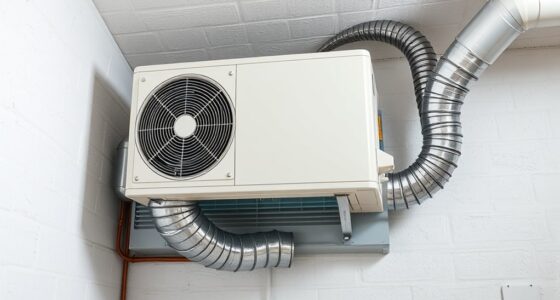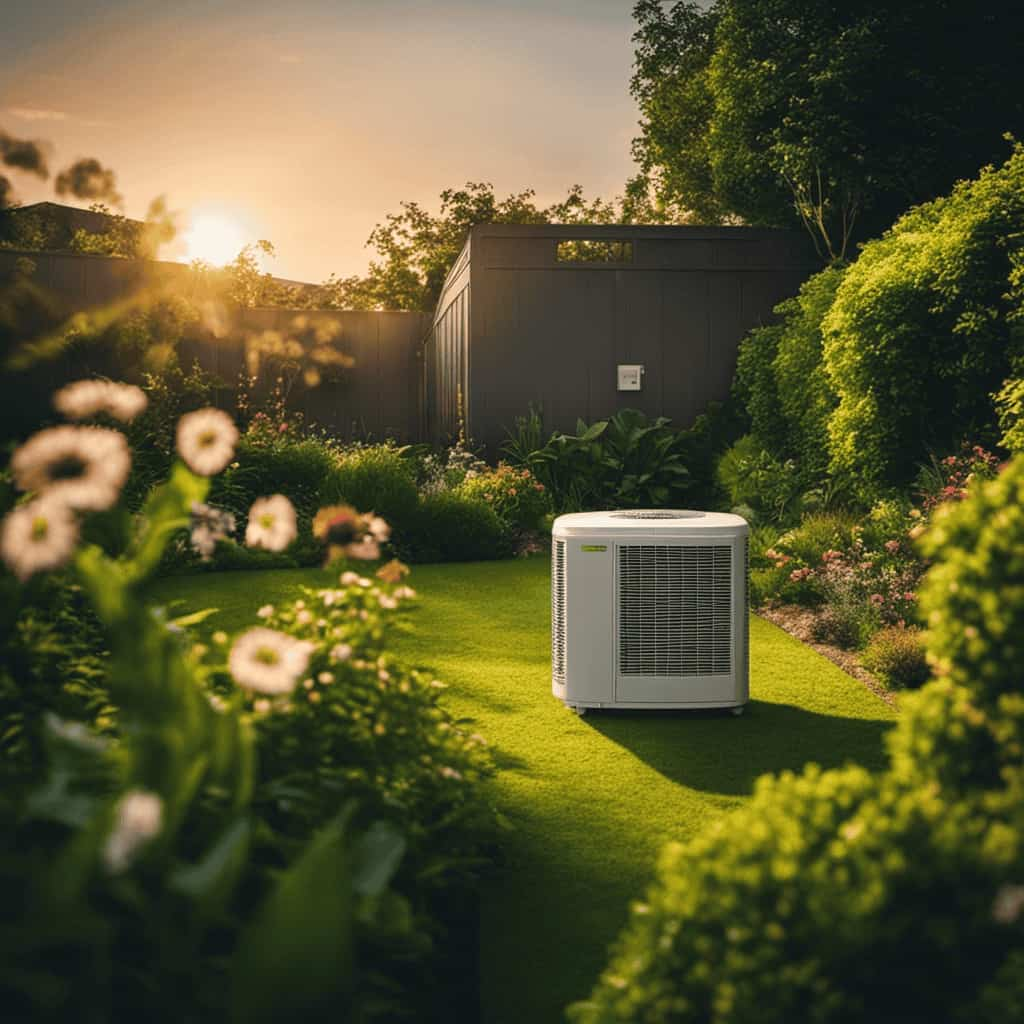Introducing our beginner’s guide to affordable home heating with heat pumps.
We’re here to help you unlock the power of heat pumps and discover a cost-effective way to keep your home warm.
With their innovative technology, heat pumps offer energy-efficient heating solutions that can save you money while reducing your environmental impact.
In this guide, we’ll explore how heat pumps work, their benefits, types, cost savings, tips for maximizing efficiency, and more.

Get ready to revolutionize your home heating system with heat pumps.
Let’s dive in!
Key Takeaways
- Heat pumps are an energy-efficient option for home heating, offering several benefits such as cost savings and environmental impact.
- There are different types of heat pumps available, including air source, ground source, ductless mini-split, and hybrid heat pumps, each with its own advantages and suitability.
- Factors to consider when choosing a heat pump for home heating include size, efficiency ratings, features, cost, and suitability for your specific needs.
- Proper installation, maintenance, and efficiency tips can help maximize the efficiency of heat pumps, reduce noise, and ensure durability and longevity.
How Do Heat Pumps Work for Home Heating
In this article, we’ll explain how heat pumps work for home heating.
Heat pump technology is an innovative and efficient way to provide heat to your home. Unlike traditional heating systems that generate heat, heat pumps transfer heat from one place to another. They extract heat from the air, ground, or water outside your home and transfer it inside to warm your living spaces.
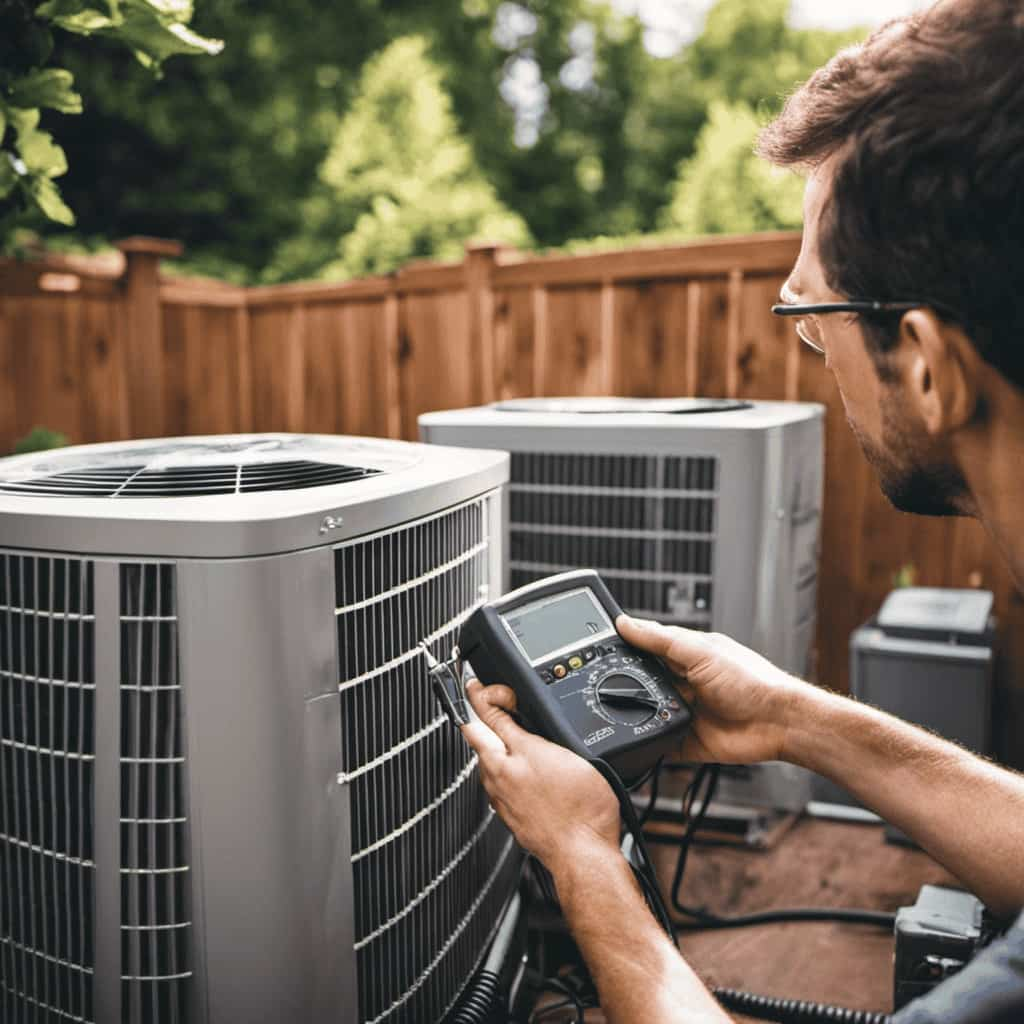
This process is achieved through the use of a refrigerant that absorbs and releases heat as it circulates through the system. One of the advantages of using heat pumps is their ability to provide both heating and cooling, making them versatile and cost-effective. Additionally, heat pumps can be more energy-efficient than other heating systems, resulting in lower utility bills.
Benefits of Using Heat Pumps for Home Heating
We love the efficiency of heat pumps for home heating. Here are some benefits of using heat pumps:
-
Energy savings: Heat pumps are highly energy-efficient, using electricity to move heat rather than generating it from scratch. This can result in significant savings on your utility bills.
-
Versatility: Heat pumps can both heat and cool your home, providing year-round comfort. They can also be used for heating water, further maximizing their utility.

-
Environmentally friendly: Heat pumps produce fewer greenhouse gas emissions compared to traditional heating systems, making them a more sustainable choice for the environment.
-
Low maintenance: With proper heat pump installation and regular maintenance, these systems can have a long lifespan and require minimal upkeep, saving you time and money on repairs.
Types of Heat Pumps for Energy Efficient Home Heating
When it comes to energy-efficient home heating, there are several cost-effective heat pump options available.
These pumps offer efficient heating solutions that can help reduce your energy bills while keeping your home warm and comfortable.

Understanding the different types of heat pumps will allow you to choose the one that best suits your needs and budget.
Cost-Effective Heat Pump Options
To maximize energy efficiency and cost-effectiveness, consider the different types of heat pumps available for economical home heating. Here are some cost-effective heat pump options to help you save on energy bills:
-
Air Source Heat Pumps: These pumps extract heat from the outside air and transfer it indoors. They’re easy to install and maintain, making them a popular choice for homeowners.
-
Ground Source Heat Pumps: Also known as geothermal heat pumps, these systems utilize the constant temperature of the ground to heat your home. While installation costs may be higher, they offer long-term energy savings.

-
Ductless Mini-Split Heat Pumps: These systems provide efficient heating without the need for ductwork. They allow for customizable heating in different zones of your home, increasing energy savings.
-
Hybrid Heat Pumps: Combining a heat pump with a traditional furnace, these systems automatically switch between the two to optimize energy efficiency based on outdoor temperatures.
Energy-Efficient Heating Solutions
To achieve energy-efficient home heating, it’s important to explore different types of heat pumps and their capabilities. Heat pumps are an excellent option for reducing heating costs while maintaining a comfortable indoor environment. There are three main types of heat pumps: air source, ground source, and water source.
Air source heat pumps extract heat from the outside air and transfer it indoors. They’re cost-effective and easy to install, making them a popular choice.

Ground source heat pumps, also known as geothermal heat pumps, extract heat from the ground using a series of underground pipes. They provide consistent heating and cooling throughout the year, but they require more upfront investment.
Water source heat pumps use water bodies such as lakes or ponds as a heat source or sink. They’re highly efficient but may require access to a water source.
When considering energy-efficient heating solutions, it’s essential to also focus on energy-efficient home insulation. Proper insulation can significantly reduce heat loss, making heat pumps even more effective and cost-efficient.
Different Types of Pumps
We’ll now cover the different types of heat pumps that are available for energy efficient home heating.

Heat pumps come in various types, each with its own advantages and suitability for different climates and households. Here are the different types to consider:
-
Air source heat pumps: These extract heat from the outdoor air and transfer it indoors, providing efficient heating and cooling all year round.
-
Ground source heat pumps: Also known as geothermal heat pumps, these use the stable temperature of the ground to heat and cool your home, offering consistent performance in all seasons.
-
Water source heat pumps: These extract heat from a water source, such as a nearby lake or pond, and are particularly suitable for homes near bodies of water.
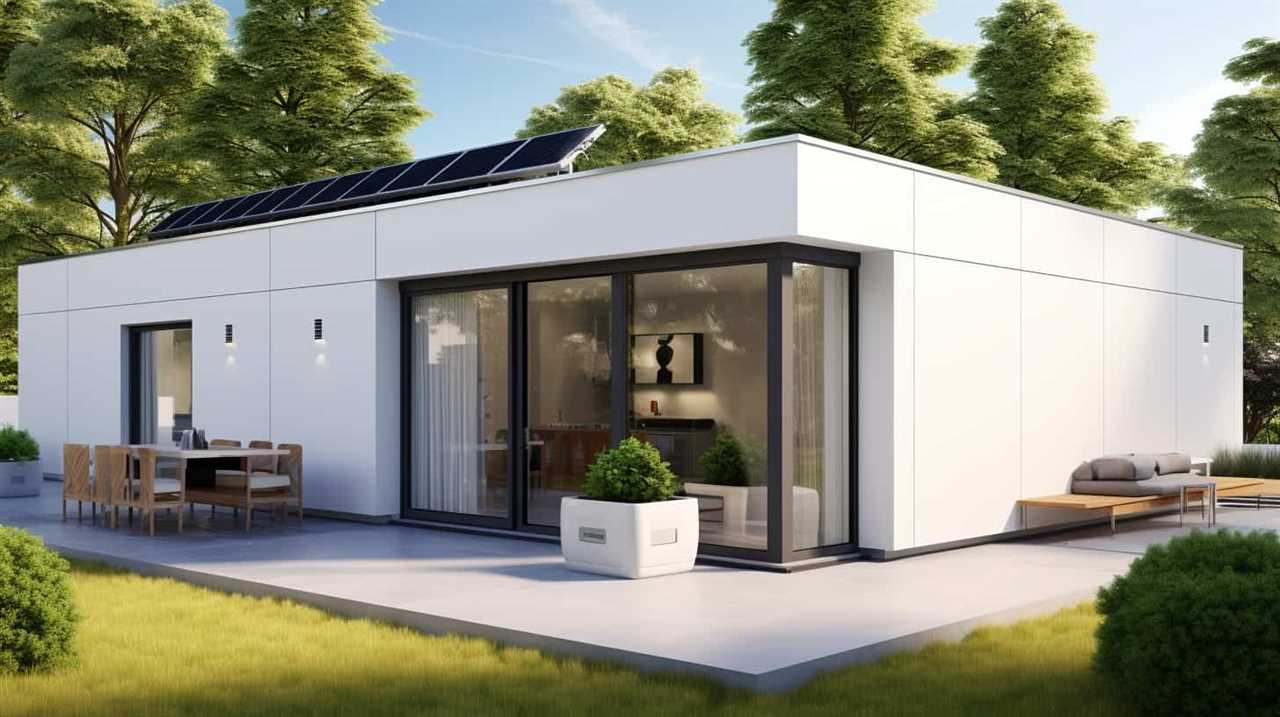
-
Ductless mini-split heat pumps: These are ideal for homes without existing ductwork, offering high energy efficiency and customizable heating and cooling zones.
Factors to Consider When Choosing a Heat Pump for Home Heating
When considering a heat pump for home heating, there are several factors that we need to take into account.
One important factor is heat pump sizing. It’s crucial to choose a heat pump that’s the right size for your home. An undersized heat pump may struggle to heat your home efficiently, while an oversized heat pump can lead to energy wastage and higher operating costs. To determine the appropriate size, consider factors such as the climate in your area, the insulation of your home, and the size and layout of your living space.
Another factor to consider is the energy efficiency ratings of the heat pump. Look for a heat pump with a high Seasonal Energy Efficiency Ratio (SEER) and a high Heating Seasonal Performance Factor (HSPF). The SEER measures the cooling efficiency of the heat pump, while the HSPF measures its heating efficiency. Choosing a heat pump with high energy efficiency ratings can result in significant energy savings and lower utility bills.

In addition to heat pump sizing and energy efficiency ratings, it’s also important to consider factors such as the reputation and reliability of the manufacturer, the warranty provided, and the availability of maintenance and repair services.
The Cost Savings of Heat Pumps for Home Heating
By comparing the operating costs of heat pumps to traditional heating systems, we can determine the potential cost savings of using heat pumps for home heating. Here are some key points to consider:
- Heat pumps are highly efficient and can provide significant energy savings compared to traditional heating systems.
- The initial cost of heat pump installation may be higher than other heating systems, but the long-term energy savings can outweigh the upfront expense.
- Heat pumps use renewable energy sources like air or ground heat, reducing reliance on fossil fuels and lowering carbon emissions.
- Heat pumps also offer the added benefit of cooling your home in the summer months, eliminating the need for separate air conditioning.
Considering the cost savings and environmental benefits, heat pumps are a smart choice for home heating.
Now, let’s delve into the next section about the installation and maintenance of heat pumps for home heating.

Installation and Maintenance of Heat Pumps for Home Heating
As we explore the topic of installation and maintenance of heat pumps for home heating, it’s important to understand the steps involved in setting up and taking care of these systems.
When it comes to installation, there can be some challenges to consider. One of the main challenges is finding the right location for the heat pump, as it requires adequate space and proper ventilation. Additionally, the electrical wiring and plumbing connections need to be properly installed for the heat pump to function efficiently.
As for maintenance, it’s essential to keep up with regular servicing to ensure the longevity and optimal performance of the heat pump. This may involve cleaning or replacing filters, checking refrigerant levels, and inspecting the overall system.
It’s important to note that while there may be some installation challenges and maintenance costs associated with heat pumps, the long-term energy savings and efficiency make them a worthwhile investment for economical home heating.
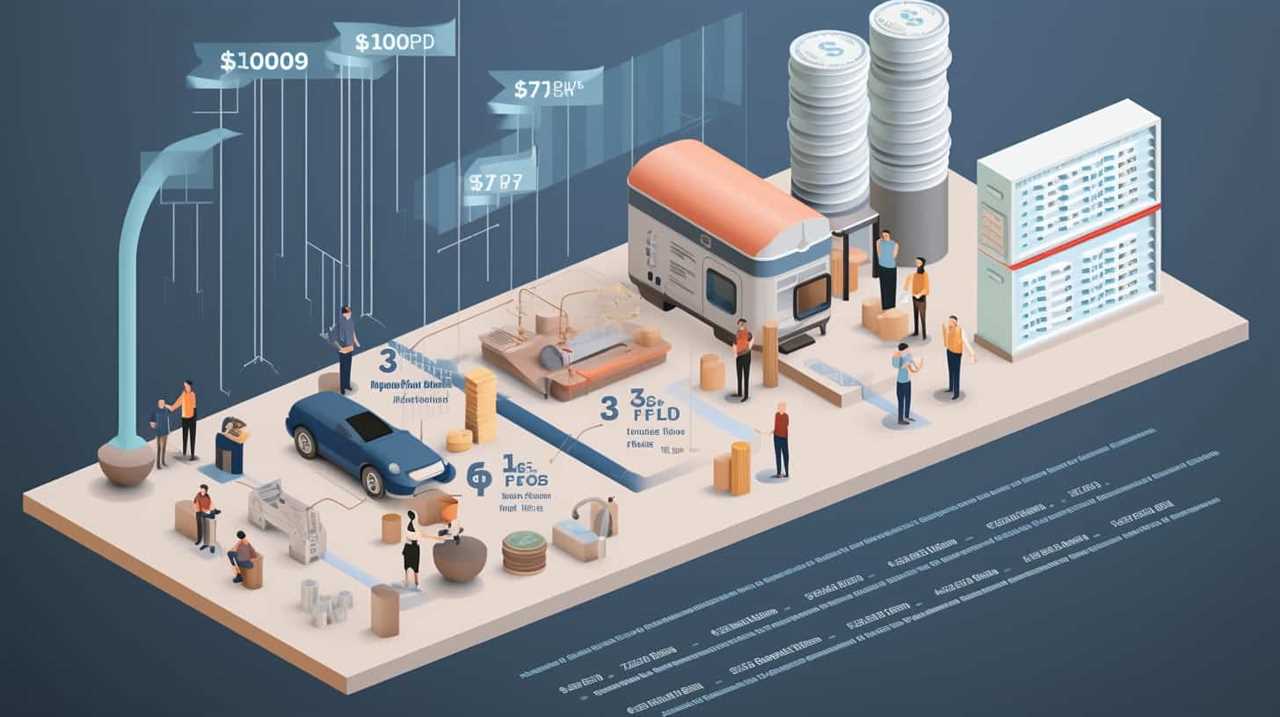
Tips for Maximizing the Efficiency of Heat Pumps for Home Heating
To ensure optimal efficiency of our heat pumps for home heating, it’s important to follow these tips:
-
Set the thermostat to a comfortable yet energy-efficient temperature. Lowering the temperature by just a few degrees can result in significant energy savings.
-
Keep the filters clean and replace them regularly. Dirty filters can restrict airflow and reduce the heat pump’s performance.
-
Maintain proper insulation in your home. Good insulation helps to minimize heat loss and maximize the heat pump’s effectiveness.

-
Schedule regular maintenance and inspections by a professional technician. This ensures that the heat pump is running efficiently and identifies any potential issues before they become major problems.
Comparing Heat Pumps to Other Home Heating Systems
We have found that heat pumps offer several advantages over other home heating systems, such as their energy efficiency and versatility. To further illustrate this point, let’s compare heat pumps to other common heating systems in terms of cost and energy consumption.
| Heating System | Initial Cost | Annual Energy Consumption |
|---|---|---|
| Heat Pump | Moderate | Low to Moderate |
| Gas Furnace | High | High |
| Electric Furnace | Low | High |
| Radiant Heating | High | Moderate to High |
As shown in the table, heat pumps have a moderate initial cost and relatively low to moderate annual energy consumption compared to other systems. Gas furnaces have a high initial cost and high energy consumption, while electric furnaces have a low initial cost but high energy consumption. Radiant heating, on the other hand, has a high initial cost and moderate to high energy consumption. Overall, heat pumps offer a cost-effective and energy-efficient solution for home heating.
Common Issues and Troubleshooting for Heat Pumps Used for Home Heating
When it comes to using heat pumps for home heating, there are a few common issues that homeowners may encounter.

One of these issues is noisy operation, which can be caused by a variety of factors such as loose components or a malfunctioning fan.
Another common issue is insufficient heat output, which can be due to issues with the thermostat settings or a problem with the heat pump itself.
In the following sections, we’ll discuss these issues in more detail and provide troubleshooting tips to help resolve them.
Noisy Heat Pump Operation
Although heat pump operation can sometimes be noisy, there are common issues and troubleshooting steps that can help resolve the problem for home heating.
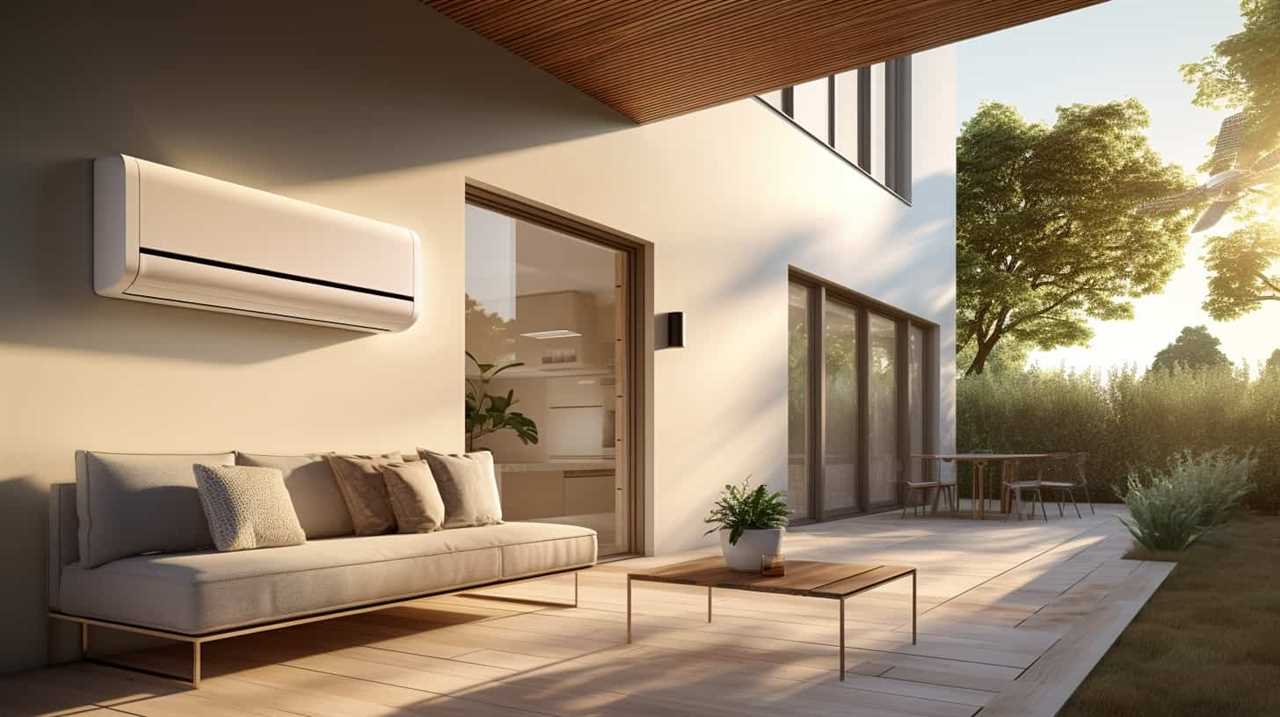
Here are some tips to reduce heat pump noise:
-
Check for loose components: Ensure that all screws, bolts, and panels are tightened properly to prevent any rattling noises.
-
Inspect the fan blades: Make sure the fan blades are clean and free from any debris that might be causing excessive noise.
-
Consider soundproofing: Install soundproofing materials around the heat pump to reduce noise transmission.
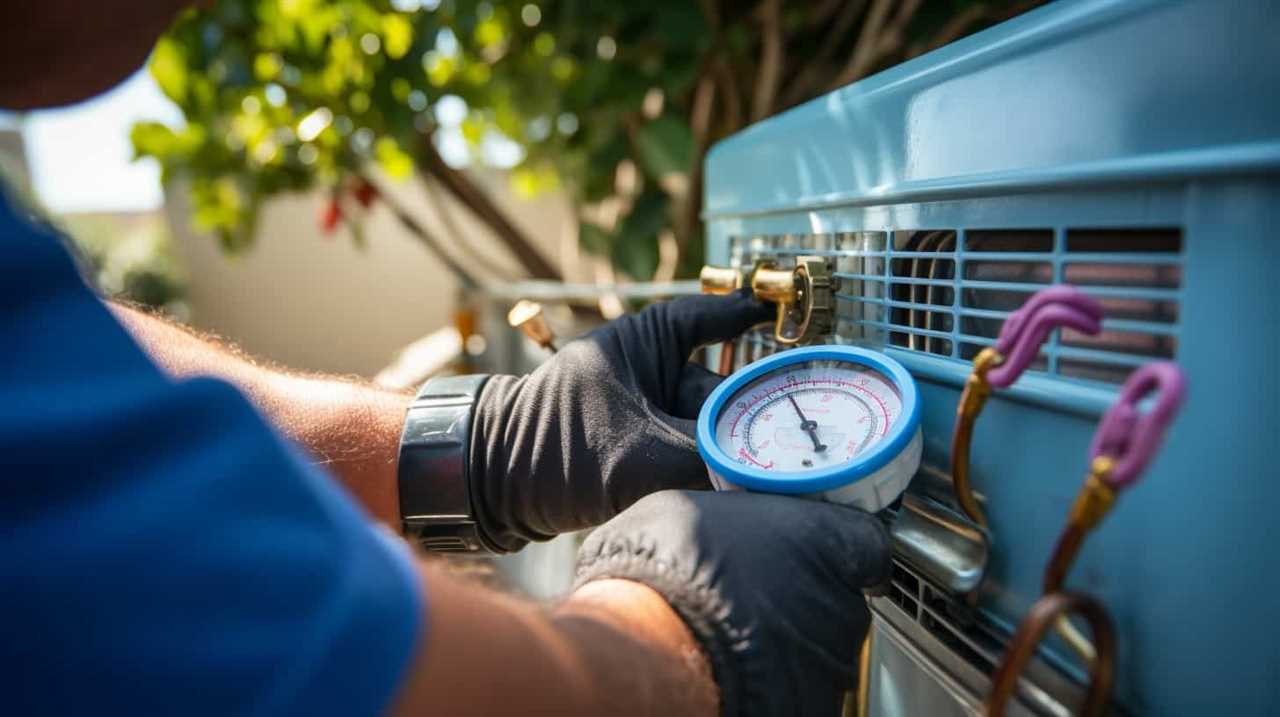
-
Regular maintenance: Schedule regular maintenance checks to ensure that the heat pump is running smoothly and efficiently.
Insufficient Heat Output
One common issue with heat pumps used for home heating is that they may have insufficient heat output. If you’re experiencing low heat output from your heat pump, there are a few potential reasons and solutions to consider.
First, check if the temperature setting on your thermostat is high enough. It’s possible that the heat pump isn’t reaching the desired temperature because the setting is too low.
Next, ensure that the air filters are clean and not clogged. Dirty filters can restrict airflow and reduce heat output. Regularly cleaning or replacing the filters can help improve the performance of your heat pump.
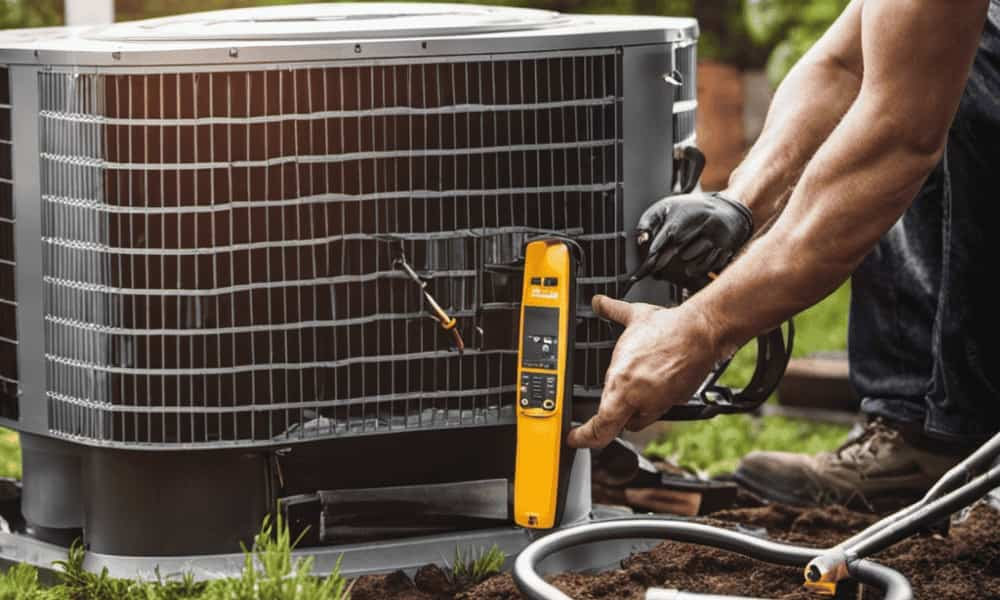
Another possible cause of insufficient heat output is a refrigerant leak. If you suspect a leak, it’s best to contact a professional to diagnose and fix the issue.
Additionally, make sure that the outdoor unit is clear of debris and vegetation. Obstructions can hinder the heat pump’s efficiency and reduce heat output.
By troubleshooting these common issues, you can increase the heat output of your heat pump and enjoy a warmer home during the winter months.
Transition: Now that we’ve covered troubleshooting steps for increasing heat output, let’s move on to discussing the environmental impact of heat pumps for home heating.

Environmental Impact of Heat Pumps for Home Heating
The environmental impact of heat pumps for home heating depends on factors such as electricity source and proper installation. When considering the carbon footprint of heat pumps, it’s important to note that their energy consumption is significantly lower compared to traditional heating systems. Here are some key points to consider:
- Renewable electricity sources, such as solar or wind power, can greatly reduce the carbon emissions associated with using heat pumps.
- Proper installation and regular maintenance ensure optimal performance and energy efficiency, further reducing environmental impact.
- Heat pumps can help reduce reliance on fossil fuels, contributing to a cleaner and more sustainable energy future.
- The overall environmental impact of heat pumps is lower compared to other heating options, making them a viable choice for eco-conscious homeowners.
Frequently Asked Questions
How Long Does It Take for a Heat Pump to Heat up a Home?
It doesn’t take long for a heat pump to heat up a home. With its efficiency and quick installation process, it’s like a rocket boosting our comfort levels in no time.
Can Heat Pumps Be Used for Both Heating and Cooling Purposes?
Yes, heat pumps can be used for both heating and cooling purposes. They are highly efficient and offer numerous benefits, such as lower energy consumption and cost savings, making them a practical choice for home heating and cooling.
Are Heat Pumps Noisy When They Are Running?
Yes, heat pumps can be noisy when running. However, with proper heat pump installation and regular maintenance, the noise can be minimized. The benefits of using a heat pump outweigh the occasional noise.
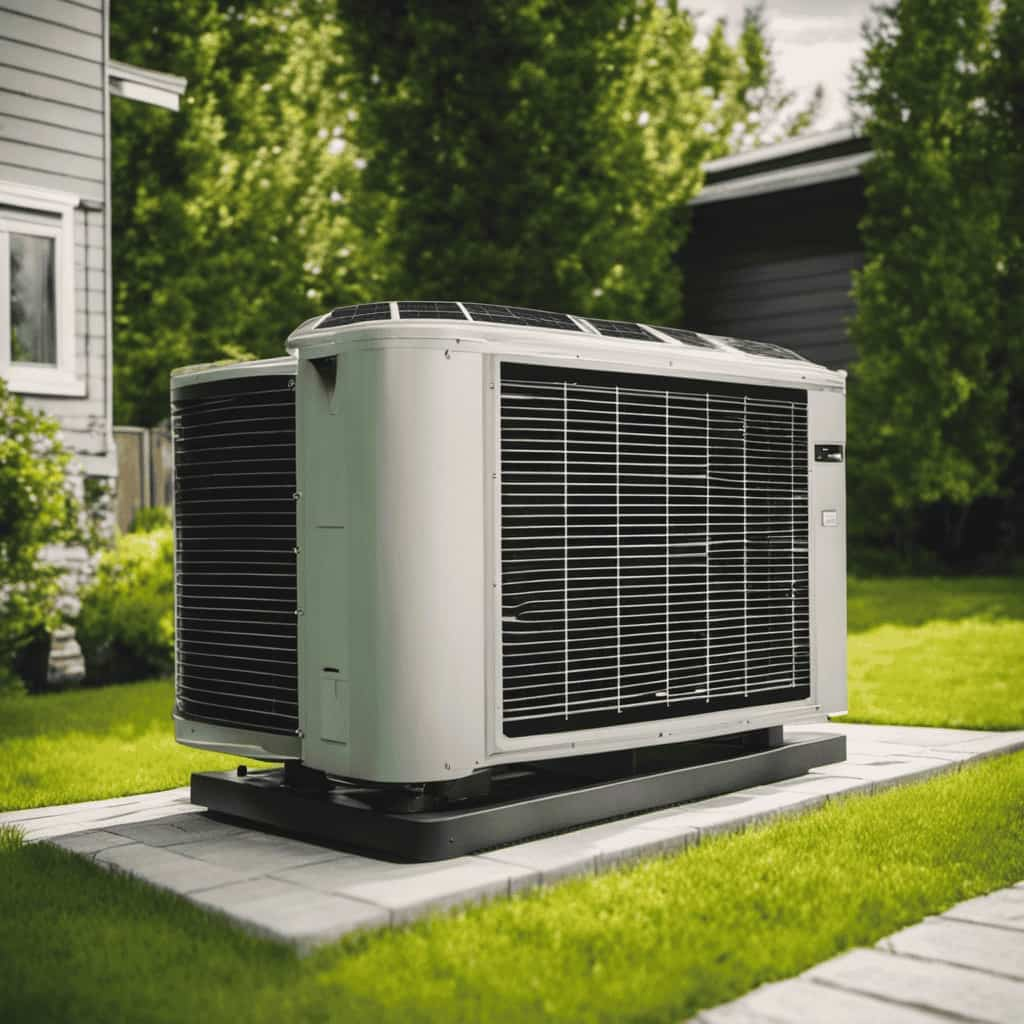
Do Heat Pumps Require Regular Maintenance?
Heat pumps do require regular maintenance for optimal performance. Here are some heat pump maintenance tips: clean or replace air filters, check for refrigerant leaks, and schedule professional inspections. Signs of heat pump failure include inadequate heating or cooling, strange noises, and high energy bills.
Are Heat Pumps Suitable for All Climates?
Heat pumps are a versatile solution for all climates. Their efficiency keeps your home cozy in the cold, while their benefits extend beyond. We’ll show you how to harness innovation for economical heating.
Conclusion
In conclusion, heat pumps offer an economical and energy-efficient solution for home heating. With their ability to extract heat from the air or ground, they provide consistent warmth while saving on energy costs.
By considering factors such as size, efficiency, and cost, homeowners can choose the right heat pump for their needs. By maximizing efficiency and comparing heat pumps to other heating systems, one can enjoy both comfort and savings.

So why wait? Embrace the warmth of heat pumps and unlock a world of affordable and sustainable home heating.




